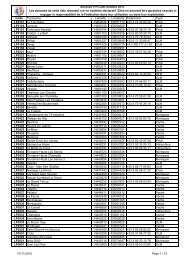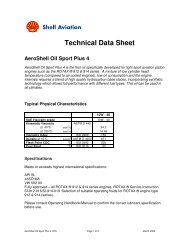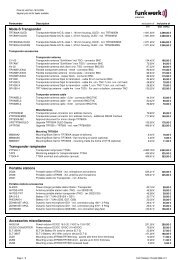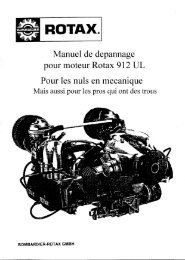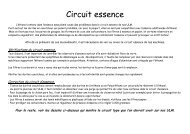Air Traffic Control English-French Lexicon - Aéro-club de Hesbaye
Air Traffic Control English-French Lexicon - Aéro-club de Hesbaye
Air Traffic Control English-French Lexicon - Aéro-club de Hesbaye
Create successful ePaper yourself
Turn your PDF publications into a flip-book with our unique Google optimized e-Paper software.
Introduction ntroduction<br />
Circuit calls in <strong>French</strong><br />
« On a recent trip to France Dinard Approach informed us<br />
that there was no AFIS at our <strong>de</strong>stination field, St Brieuc,<br />
and we should make blind calls on St Brieuc's frequency for<br />
the benefit of other traffic. We did so, with no reply until<br />
someone said "eet would be bettair eef you speak <strong>French</strong>".<br />
Whilst my <strong>French</strong> is a<strong>de</strong>quate, it does not inclu<strong>de</strong> the<br />
accepted forms of radio calls used, so I had to reply that my<br />
<strong>French</strong> was not good enough and continued in <strong>English</strong>,<br />
keeping a good lookout.<br />
Is there somewhere one can get a list of standard <strong>French</strong> r/t<br />
terms for "downwind", "final" etc.? Or perhaps you have a<br />
<strong>French</strong> rea<strong>de</strong>r who could provi<strong>de</strong> me a brief gui<strong>de</strong> for the<br />
benefit of <strong>English</strong> visitors to France ? »<br />
C<br />
'est aux questions désespérées <strong>de</strong> ce pilote privé anglais parues dans la revue<br />
spécialisée britannique Pilot du mois d'octobre 1995 que j'entends répondre en<br />
rédigeant ce mémoire. La situation dans laquelle il s'est retrouvé est loin d'être<br />
inhabituelle. Pas plus que la situation inverse. De nombreux pilotes français,<br />
frontaliers ou non, se ren<strong>de</strong>nt quotidiennement par la voie <strong>de</strong>s airs chez nos voisins européens.<br />
D'un point <strong>de</strong> vue réglementaire, dans un pays donné, le contrôle <strong>de</strong> la circulation<br />
aérienne s'effectue dans la langue officielle <strong>de</strong> ce pays et par défaut en anglais, selon la<br />
phraséologie officielle <strong>de</strong> l'OACI (Organisation <strong>de</strong> l'Aviation Civile Internationale). En<br />
France, les pilotes privés français, s'ils veulent voler en <strong>de</strong>hors d'un espace aérien<br />
francophone, doivent être titulaires au moins <strong>de</strong> la QRRI (Qualification Restreinte <strong>de</strong><br />
Radiotéléphonie Internationale) qui se décompose en <strong>de</strong>ux examens :<br />
• le certificat restreint <strong>de</strong> radiotéléphoniste à bord <strong>de</strong>s stations maritimes et aéronautiques <strong>de</strong><br />
France Telecom. Cet examen est en français.<br />
• l'évaluation en vol <strong>de</strong> l'aptitu<strong>de</strong> à comprendre et à s'exprimer en langue anglaise à la radio<br />
pour <strong>de</strong>s manoeuvres simples. Cette évaluation est effectuée sur un terrain contrôlé par un<br />
contrôleur <strong>de</strong> la circulation aérienne.<br />
Si, pour l'examen <strong>de</strong> France Telecom, il existe <strong>de</strong> la documentation (France Telecom diffuse<br />
son propre livret d'étu<strong>de</strong>s), il n'en est pas <strong>de</strong> même pour la phraséologie internationale <strong>de</strong><br />
l'OACI. La majeure partie <strong>de</strong>s ouvrages traitant <strong>de</strong> la radiotéléphonie internationale<br />
disponibles sur le marché s'adressent aux pilotes professionnels et sont d'une approche abrupte<br />
6


